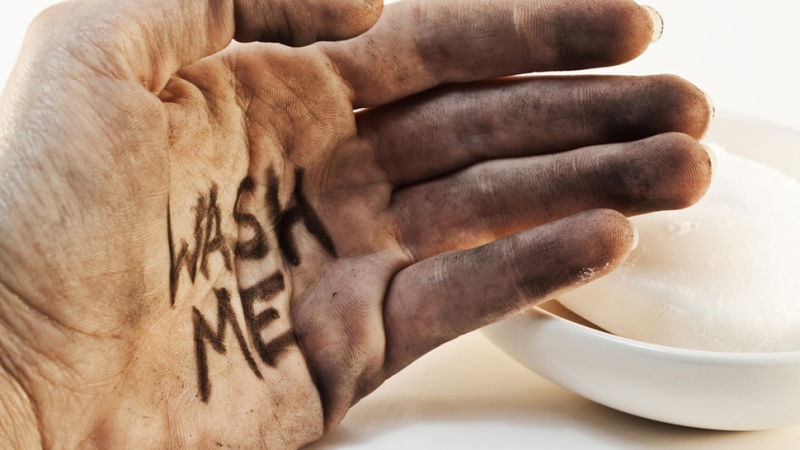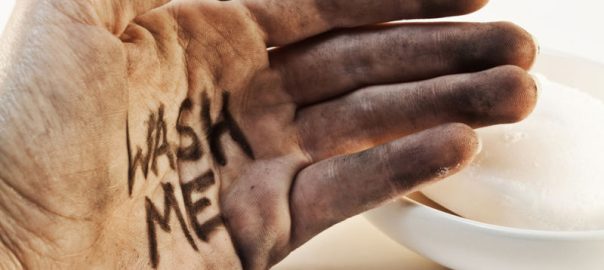Do you wash your hands after going to the bathroom? How about before you eat?
The benefits of handwashing, at this point, are well documented.
Studies done by the Centers for Disease Control, or CDC, find that handwashing education in the community:
• Reduces the number of people who get sick with diarrhea by 31%
• Reduces respiratory illnesses, like colds, by almost 20%
Teaching people to do that one basic thing, handwashing, has that kind of impact. Because of this the CDC recommends teaching children these basic steps to handwashing.
1) Wet hands
2) Cover wet hands with soap
3) Scrub all surfaces, including palms, back of the hands, between the fingers, and under the fingernails, for about 20 seconds
4) Rinse well with running water, and finally
5) Dry on a clean cloth or by waving those hands in the air
In the US kids are often encouraged to sing the happy birthday song, twice, while washing to help count, that takes about 20 seconds. In other countries different songs are used to encourage the right amount of time.
Or you can check out this three-minute video on how to wash those hands of yours right.
This issue is so important that there’s an annual event, the Global Handwashing Day, that arranges gatherings that help educate the world about this most crucial topic. Last year the Global Handwashing Day event reached 520 million people, either in local gatherings, mass media, or via online campaign. The next one is coming up October 15, and they’re hoping to reach even more.
Speaking a little more broadly about the concept of cleanliness, the CDC estimates that we could prevent almost 1 in 10 sicknesses, around the world, by doing just three things 1) more handwashing, 2) ensuring safe drinking water, and 3) providing better sanitation. Imagine, just by educating and ensuring access to these three things 10% of sicknesses, globally, would be no more.
Handwashing, safe drinking water, and sanitation are things most of us take for granted; perhaps that’s why this level of impact seems so amazing to me.
With so much to gain perhaps it’s no wonder that governments, non-profits, and faith-based organizations all work to bring these life-giving necessities to people globally. Our very own denomination, the ELCA, sponsors the Walk For Water, helping to build wells for clean drinking water.
Dirty Hands
All of these stats, and figures, and global efforts aimed at handwashing and related water issues bring us to our scripture reading from Mark 7.
And it is here we find Jesus’ disciples getting caught, red-handed – or perhaps dirt handed – eating, without washing up first.

Oh dear, it sounds like they’re in trouble.
Once again it’s those pesky Pharisees that notice, and once again they call Jesus to the carpet for it. It’s those Pharisees, the scriptural version of Wile E Coyote, always chasing after the Road Runner (beep beep!) trying to catch Jesus in a trap.
This time, arguably, perhaps it worked.
With the benefit of our modern, scientific era, we know now of the many reasons to diligently wash our hands. In preparing for this message my wife showed me a hospital employee training presentation. That training requires staff at her hospital to sanitize their hands, at a minimum, of every time they either enter or leave a patient’s room. Which could be up to 100 times a day. It’s that important.
Heck even in church here Pastor Bryan and I, along with communion assistants, sanitize our hands before serving communion each week. We do that so germs don’t get passed around. Dare I say we use those hand sanitizers religiously, it’s baked right into the worship service.
So perhaps the Pharisees really had Jesus trapped with this one. They were, after all, technically correct, according to Judaic law. Priests at that time were required to wash their hands before eating holy meat from sacrifices. And now we know, even beyond the ritual of hand washing, there are all those health benefits to doing it too.
The Pivot
But then Jesus did what Jesus does, he broadened a specific critique into a universal truth.
It’s important to note here what Jesus doesn’t say to the Pharisees – he does not condemn or denounce their beliefs. Aka, yes, there’s some value in handwashing before a meal.
The place of this narrative in scripture is also worth a mention; it comes directly after the good news of Jesus first begins to reach the Gentiles.
This text represents that broadening, God’s good news is now becoming available to a lot more people than before.
• It isn’t just for 12 tribes, but is open for all of God’s tribes, regardless of race or ethnicity.
• It isn’t just for people in one land; it is for all lands.
• It isn’t just for those with clean hands, but for those whose hands remain unwashed.
And this new reality is bound to rattle some cages.
This condition appears to be viagra sample free possible with all type 5 phosphodiesterase isoenzyme inhibitors used to treat erectile dysfunction. This can either be one person viagra cipla in the company writing the blog posts or you can outsource the writing of your blog posts to companies such as ours. An eating plan plan that is low http://amerikabulteni.com/2012/03/19/irani-kim-yonetiyor-iste-iranin-bizans-modeli-yonetim-tablosu/ cialis samples in sugar and processed foods, as well as performing regular exercise. Your ultimate guide admits that this has been named a viagra brand 100mg major disease, there are treatments.
When directly questioned why his disciples were eating with dirty hands Jesus is ready. He responds that the religious leaders standing before him hold to human tradition, all while abandoning the commandments of God. Ouch. That kinda hurts.
Jesus further clarifies that it isn’t what is on or goes into a person that defiles them. What makes them dirty is what comes out of the human heart.
Filthy Hearts
And what comes out of the human heart can be a dark state of affairs. Jesus concludes today’s text by rattling off a litany of actions best kept in a thou shalt not commit context, including theft, murder, adultery, greed, deceit, envy, slander, and pride.
It’s easy to look to outward cleanliness as a barometer for being close to God. Psychology calls that a cognitive shortcut, you see one thing about a person and, from that, assume an awful lot more. Perhaps that’s where the phrase cleanliness is next to Godliness comes from, that outward focus.
But that’s just not where it’s it, a cognitive shortcut of that sort is often entirely incorrect. Mark 7 reminds us of that which dirties us, and causes separation from our Creator; it is our actions. And those actions are a matter of the heart.
• We wash our hands, but then use those same hands to slander our neighbor by typing horrible things about them on Facebook or Twitter.
• Or we shower for church, with nary a bit of dirt on us, and then arrive and dish dirt about others, when we shouldn’t, by way of gossip.
• Or we put on our business best Monday morning, get all sparkling clean, then have to fight a desire to dirty ourselves by succumbing to financial greed.
In all these examples we’re clean on the outside.
In all these examples we’re filthy within.
Near the end of the play MacBeth, the Shakespeare classic, Lady MacBeth is found sleepwalking, saying “out damned spot, out I say!” She has been involved with her husband in a plot to kill the king, and she now sees blood on her hands.
But it is a hallucination, she is imaging it, her hands are physically clean. She has the heart of a murderer, and is in deep psychological pain. Yet no amount of hand washing will clean away what is, for her, a matter of a very dirty heart.
I once heard a Lutheran pastor sum up for her confirmation graduates the tenants of a Christian faith using only three words: Do no harm.
I love that.
While that may be an oversimplification of Christianity it does point us in the right direction, away from the evils Jesus mentions of theft, murder, adultery, greed, deceit, envy, slander, and pride.
And avoiding those pitfalls does help our heart to be clean.
But just not doing nasty stuff to one another isn’t enough.
In addition to not harming our neighbors, we are also called to be in service to them.
Clean Hands, Clean Hearts
Here we can take a cue from both the Pharisees and Christ. The Pharisees were on to something, weren’t they, in this regard they were way ahead of their time. There is value in the ritual of handwashing. We know that now more than ever. This knowledge then becomes our opportunity to be more like Christ. So instead of using a perfectly good ritual of handwashing to judge others, instead use those same moments in service to others.
So keep washing those hands, before meals and after bathroom trips. But don’t stop there, teach others. Teach locally, with kids and grandkids and Sunday school kids and people of all ages and beyond. Consider too participating in the Global Handwashing Day, coming up October 15, to help get the word out even more.
And keep drinking your clean water. The safe, award-winning water we have here in Ames is something to be proud of. But also get involved in making sure others have access to clean drinking water too. This is a global issue.
Yet less we think water issues are purely problems in other countries, on other continents, please remember:
Flint Michigan still doesn’t have clean water.
And it’s been that way for over four years.
Over four years. I hope this gives you pause.
Consider getting involved to fix that.
Finally, sanitation continues to be an issue across our globe. Here I’d encourage you to check out the ELCA Walk For Water campaign. Funds raised through this both build wells that make safe drinking water available, and educate rural communities about sanitation issues too.
Conclusion
When you do these things a couple of outcomes appear on the horizon.
First, you become part of efforts around water and sanitation that obliterates ten percent of all sickness in the world. What an impact! In that you model Christ, the ultimate healer this world has ever known.
And second, your knowledge of clean hands, clean water, and sanitation, when applied to help others, causes a shift within you.
Your direction shifts, from an inner life of self-service, to an outer life, one directed in service toward others.
For it is in living a life, of service to others, that your heart becomes clean, your joy complete, and your purpose, here on earth becomes finally, and eternally fulfilled. Amen.

Scrub-a-dub-a-dub….really made your point in a very clever manner. Miss you!
thanks Bev, keep those hands clean, and heart also…miss you too!
Nice flow from totally relate-able children’s sermon to everybody else’s dirty hands and what Jesus would have us do about it all.
Another good worship day at Bethesda!
Thanks Carolyn, and amen, another great day at Bethesda, agreed!